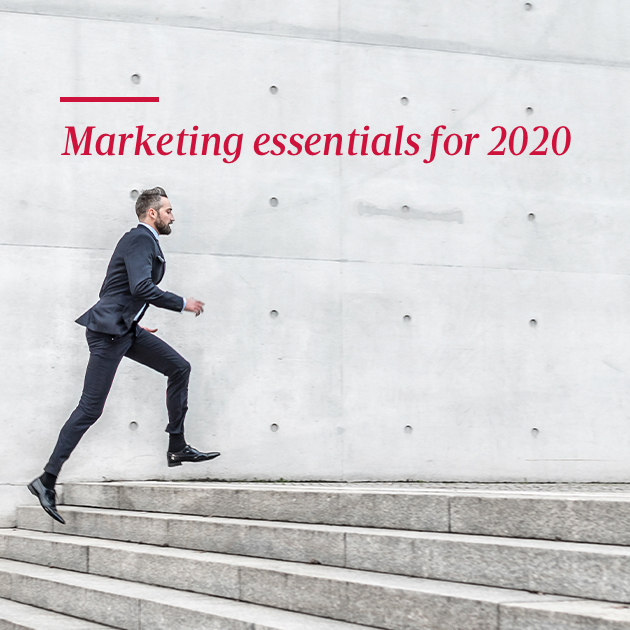Marketing essentials for 2020
As another decade ends, we’re taking a step back to offer our perspective on a few of the essentials for anyone working in marketing in the decade to come.
For some, it seems like the 2010s redefined their view on the discipline of marketing completely. To us, the foundation for a successful marketing strategy and function have not changed. However, we believe that the potential for real marketing impact could improve twofold if you manage to apply consistent and rigorous strategic thinking to how you exploit new tools and opportunities. What follows are six subjective observations on what we believe successful marketers will need to focus on in 2020 and beyond.
1. From good intentions to real thought leadership
Today, almost every company works to define their purpose – inspired by the UN’s 17 SDG goals. However, in many cases, the approach appears to be to “just” reformulate what they have always done within a new SDG context, or, simply, to focus on the generic function of what the company do.
To become a true thought leader, you need to define your impact on two levels:
- Focus on a real societal challenge that should be addressed in a new way in order to fulfill one or more SDG goals – show “thought leadership”
- Define how your operations drive change – show “solution leadership”
To go beyond good intentions, both levels must be clearly linked.
2. Sustainability as a business driver
According to WARC, 84% of marketers believe conscious consumerism and sustainability will impact their 2020 marketing strategies. In a time of (a lot of talk about) action, it is tempting to be the brand that takes the lead on ambitious sustainability agendas. But, before doing so, you need to ask yourself: what do your customers really care about? Does your business model provide a credible platform for such an agenda? And, what change can we, as a company, actually make?
The companies we see showing real leadership on sustainability understand not to stray from their core business in pursuit of “a better world vision”. To succeed means driving a strong business with sustainability embedded in the core before being able to conquer a solid position on it. Not the other way around.
3. Solution concepts get the big breakthrough
Over the years, we have seen a shift from standalone products and features to solutions – with regards to how companies create customer value and real differentiation. And, while plenty of companies have shown some success, we are yet to see the real breakthrough. With many business models being redefined by digitalisation, the move towards solution concepts is driving a new demand for understanding value and redefining customer relationships. So, if customers are no longer swayed by our products, then, what will attract them? How do you define real customer value when you go from selling a product to selling a solution to a problem? This often requires a complete turnaround in a company’s commercial model, marketing and organisation.
4. The move towards full commercial excellence
We’re starting to see a shift in the way the industry views sales excellence. You cannot keep training your sales team and hope for results if your customers are not ready to talk. It is becoming increasingly difficult for sales departments to get time with prospects, and companies need to rethink commercial excellence as a discipline that is not only about traditional sales – as it is often seen. With digitalisation increasing the opportunities to reach customers at an early stage within the decision-making process, lead nurturing, generation and a wider part of the lead management process now require new and better ways of communicating that go way beyond face-to-face interactions. Achieving full commercial excellence requires sales and marketing to come together with shared accountability to drive the full customer journey.
5. From MarTech to … well, marketing
We have experienced a decade of big leaps with regards to new technology within marketing. Technology is extremely exciting – it is a big part of what will make the next decade even more thrilling than the last. But, as with any seismic shift, this has resulted in many companies feeling left behind, unable to utilise new opportunities to their full extent. Consequently, scaling up the tech stack has, in many places, become somewhat of a goal on its own. This has resulted in many brands piling their resources into tech despite only being able to utilise a fraction of the possibilities promised. In the end, this has hurt effectiveness as tech investments often pull resources from a company’s marketing budget, the likes of which should be used to build reach, frequency and impact in the market.
We believe the coming decade’s leaders will understand how to keep customers at the core of everything they do. Instead of starting with a goal to fulfil a tech ambition, companies need to start by identifying who their core customers are, and what they desire. And then do everything they can to build a focused positioning with them through clear value propositions, sharp concepts and, importantly, consistent reach and frequency. Often, this entails moving from traditionally product-focused campaigns to customer programs that focus the entire organisation’s commercial resources around the targeted customer segment.
While tech plays an important role in getting closer to customers, it will never be more than an enabler and should, therefore, be disregarded as the starting or end point for any marketing strategy.
6. Enter the decade of big bets
As the possible role of the marketer continues to expand across everything from commercial strategy, customer experience and data, to tech, commercial excellence and more, this runs the risk of blurring focus.
That’s why, at Kunde & Co, we believe in the power of NO – more than ever. Because, while setting the direction any solid marketing strategy will also need to clearly define what NOT to do. To succeed, therefore, means focusing even more on the areas where you must win. Bearing in mind that with an ever-growing number of communication channels, data and tech opportunities, marketers are required to be much sharper when it comes to choosing priorities, and much deeper when it comes to understanding their customers. If priorities are not clearly made the explosion in content, channels, wet dreams of micro segmentation and personalisation, as well as the growing number of internal stakeholders, risks scattering and diluting your budget and impact completely.
To cut through to your customer segments, we believe you will need to be highly selective and only develop between two to five big bets to invest in. This is critical to building impact in the market and setting a course your organisation can get behind. It could be you prioritise those one or two major innovations that could help build your market position, instead of scattering your investment across 14 different product launches. It could be making a big bet towards building a sustainability position from your core business. Or it could be that you invest ahead of the curve to move customers to new subscription based business model to claim the position.
Indeed, this coming decade’s winners will be those bold enough to seek out these big commercial bets. With a solid strategic foundation, courage and creative thinking, we believe the returns will be well worth the risk.
A Merry Christmas and Happy New Year from all of us at Kunde & Co



